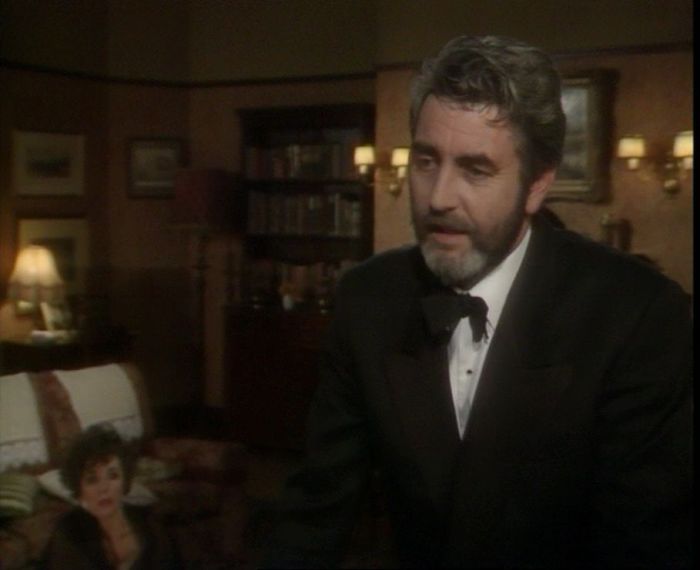Relations between Elizabeth and Lawrence are worsening due to his inability to consummate their marriage. Shuddering at the thought of such gross physical activity, he turns to his publisher and mentor – Sir Edwin Partridge (Charles Gray) – who may be able to assist ….
The opening of this episode feels a bit abrupt (the UpDown website confirms that the first few lines are inexplicably missing from all copies currently in circulation). Thomas’ incredulity that bootlaces and newspapers need to be ironed raises a smile (as does his suggestion that he could do the same to the bacon). The truculent cook, Mrs. Fellowes, also helps to create an air of sour comic relief – it’s all to do with her leg you know.
Laughs are thin on the ground when we move upstairs to Elizabeth and Lawrence’s bedroom. His total disinterest in that side of their relationship (as a poet he apparently finds it too ghastly to contemplate) is made plain – which launches Elizabeth into the realms of deepest despair. Matters get no better over the breakfast table and they part – he to visit Sir Edwin – on the worst of terms.
Elizabeth has very few role models to turn to. It would be impossible to speak to her mother about such a delicate subject, so instead she sounds out Rose. This is a gloriously uncomfortable scene – the pure and innocent Rose is just about the last person to advise anyone on sexual matters (all she can do is pass on second hand information about her aunt and uncle’s strained relationship and how all working men are only after one thing).
Given that the first half of the episode is claustrophobic and rather unhappy, it’s a jarring (but not unpleasant) change of pace when the action switches to Thomas and Elizabeth taking a drive. The wily Thomas has persuaded the Kirkbridges that buying a car would be a wise move – he, of course, will be more than happy to act as chauffeur. Although the OB VT makes things look a little cheap, it still must have been quite an expensive scene to mount as there’s a fair number of extras dotted about the park.
Whilst Elizabeth is getting the colour back in her cheeks, Lawrence is unburdening his soul to Sir Edwin. Charles Gray is on typically mesmerising form throughout – purring like a particularly well-fed cat as Sir Edwin elects (with Lawrence’s blessing) to try and lift Elizabeth’s spirits by any means necessary.
By seducing her? During a party held by Lawrence to celebrate the publication of his new book, Sir Edwin and a rather tiddly Elizabeth do visit her bedroom, but it’s not specified in this episode exactly what they get up to. Sir Edwin does look satisfied when he later bids Lawrence farewell, but then that seems to be his default setting.
Elizabeth and Sir Edwin’s conversation during the party is fascinating. Although he toys with her, Elizabeth does possess some intellectual tools of her own (even though, as events during previous episodes have proved, she still has a strong streak of naivety).
The champagne flows freely at the party, which is just as well as the sample we have of Lawrence’s poetry (all doom laden stuff) would no doubt sound a little better after a few stiff drinks.
In some ways Married Love serves as a prologue to the drama of the next episode, but John Harrison’s script (the second of his two UpDown efforts) is still a strong vehicle for Elizabeth. Since Harrison’s previous effort was The Path of Duty (Elizabeth’s debut in the series) it’s possibly not surprising he was chosen to move her character on to the next stage.








